- Учителю
- Методический материал по страноведению для уроков английского языкаSochelnik (Christmas Eve)
Методический материал по страноведению для уроков английского языкаSochelnik (Christmas Eve)
Sochelnik (Christmas Eve)
1.
New words: The Russian Orthodox Church - Русская православная церковь; official holiday - официальный праздник; Christmas Fast - Рождественский пост; Christmas Eve - сочельник, канун Рождества; believer - религ. верующий
-
Do you like holidays?
-
Do you know that many people celebrate the religious holidays? What orthodox religious holidays believers celebrate in our country?
-
Read the text below. Name two of the largest holidays in Orthodox Church.
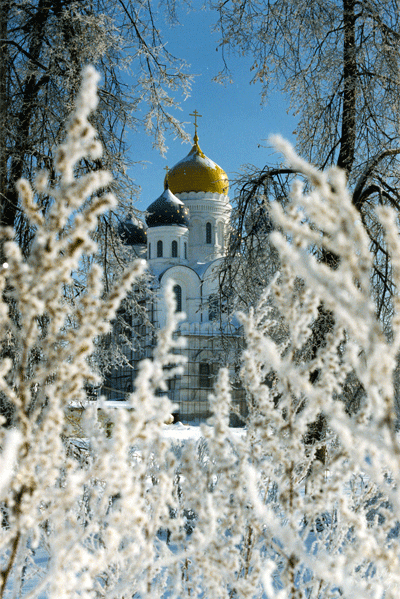 In
Russia, Christmas is annually celebrated on January 7th, thanks to
the Russian Orthodox Church that has made it an official holiday in
the country. The Russian Orthodox Church is more than one thousand
years old and most of the Christian population in the country
belongs to it. In Russia the Christmas Eve is called Sochelnik, or
Kolyada. It is the last day of Christmas Fast that lasts for 40
days. This means that the believers observing this fast don't eat
meat, eggs and dairy products during this period, go to church more
often than usual, thus preparing themselves for the second largest
holiday in Orthodox Church - Christmas (Easter is considered to be
the most important one).
In
Russia, Christmas is annually celebrated on January 7th, thanks to
the Russian Orthodox Church that has made it an official holiday in
the country. The Russian Orthodox Church is more than one thousand
years old and most of the Christian population in the country
belongs to it. In Russia the Christmas Eve is called Sochelnik, or
Kolyada. It is the last day of Christmas Fast that lasts for 40
days. This means that the believers observing this fast don't eat
meat, eggs and dairy products during this period, go to church more
often than usual, thus preparing themselves for the second largest
holiday in Orthodox Church - Christmas (Easter is considered to be
the most important one).
-
-
Is Christmas an official holiday in our country?
-
What are the synonyms of the Christmas Eve in Russia?
-
What does the word Fast mean?
-
New words: Star of Bethlehem (вифлеемская звезда) - the Bible says that when Christ was born a bright star appeared above Bethlehem. The star on top of Christmas trees now represents the Star of Bethlehem; eight-angle star - восьмиугольная звезда; tablecloths - скатерть; rug - ковёр.
-
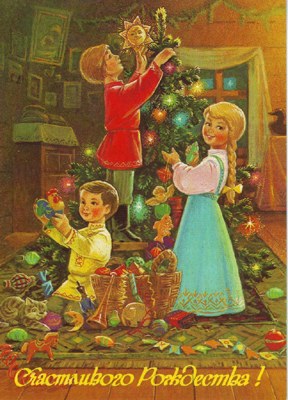 Look
at the picture. What are the children doing?
Look
at the picture. What are the children doing?
-
Do you help to decorate a Christmas tree?
-
Read the text below
Before Christmas Eve, people clean and tidy their house and yard, and decorate the house in a lavish manner (щедро). Beautiful decorations, tablecloths, napkins, and rugs are used to create a festive atmosphere. A Christmas tree is also common - sometimes adorned with foods due to the high cost of decorations. On the top of it there is an eight-angle star, symbolizing the star of Bethlehem.
-
What decoration do you use to create a festive atmosphere at home before Christmas Eve?
-
Project work. Would you like to make a Christmas decoration? Research these links:
-
www.youtube.com/watch?v=lDvpQn3fUcg
-
www.youtube.com/watch?v=L9_-vBvoMxg
-
www.videojug.com/film/how-to-make-a-christmas-tree-bauble
-
www.youtube.com/watch?v=yiMuBAegh8k
-
www.squidoo.com/craftychristmas
-
adalin.mospsy.ru/ny/eligr.shtml
-
www.christmasheaven.ru/articles.php?article_id=94\
-
www.wild-mistress.ru/wm/wm.nsf/publicall/2008-10-31-83745.html
Try to make this decoration just now.
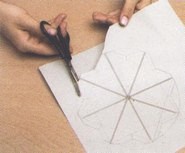
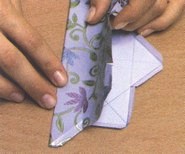
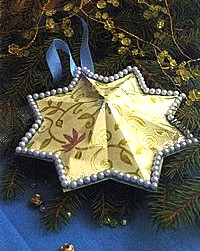
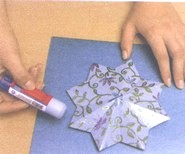
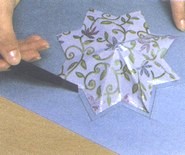

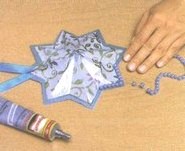
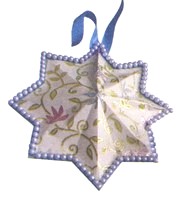
New words: sochivo - сочиво; pancakes - блины; оладьи; fish jelly - рыбное заливное; meat jelly - студень; roast young pork with porridge - жареный молочный поросенок с кашей; vzvars - прохладительный напиток из сухих фруктов и ягод, иногда с добавлением мёда; kutya - кутья; fast - пост а) (временное воздержание от некоторых видов пищи, предписываемое различными религиями) б) (период такого воздержания); rye dough - ржаное тесто
-
How do you like to help your mother to prepare a holiday dinner?
-
What is your favourite holiday food?
-
Have you ever heard about special Christmas feast?
-
What are traditional Russian Christmas dishes? List as many as you can remember. Compare your list with that of your partner. Now read the text and complete your lists.
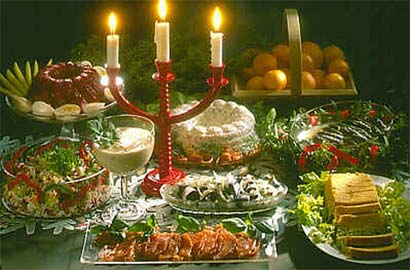 Sochelnik
is considered to be a family dinner. In the days of old the
Christmas table was strewed with hay and then only covered with a
tablecloth. Twelve dishes (according to the number of the Apostles)
were put in the centre of the table. Apart from sochivo the feast
would offer pancakes, fish, fish and meat jelly, roast young pork
with porridge, honey cakes, vzvars, etc., depending on what the
family could afford.
Sochelnik
is considered to be a family dinner. In the days of old the
Christmas table was strewed with hay and then only covered with a
tablecloth. Twelve dishes (according to the number of the Apostles)
were put in the centre of the table. Apart from sochivo the feast
would offer pancakes, fish, fish and meat jelly, roast young pork
with porridge, honey cakes, vzvars, etc., depending on what the
family could afford.
Nowadays the menu usually depends on the wealth of the families. A typical Christmas dinner however, includes delicacies such as hot roast Pirog (Russian pies made out of meat, fish, mushrooms, potatoes or cabbage), and Pelmeni (meat dumplings).
Sochelnik is the day of rigorous fast (строгий пост). On this day there is a long-hour church service (продолжительная церковная служба), which begins with the so called 'Tsarskie Chasy' (царские часы) or the Royal Hours. The Russian Tsar and his family used to attend this kind of solemn (торжественной, священной) service, including reading of psalms (псалмы) and prayers (молитвы), so it got its name. On the whole, the service is very long and after you have attended it, you may eat a little. That is why there is a saying that you can't eat anything on Christmas Eve, until the first star has appeared in the sky.
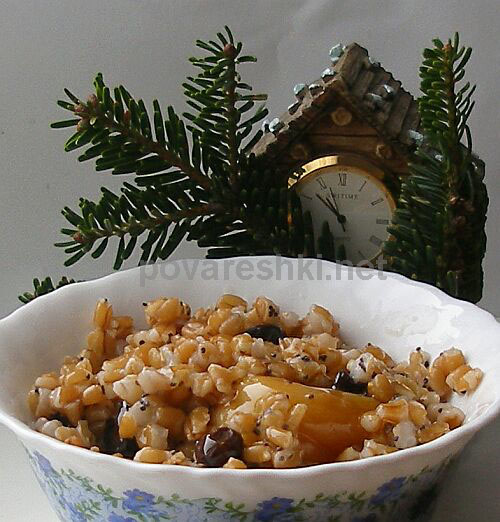 People
then eat 'sochivo'. It is made of boiled grains of wheat, barley or
rice mixed with raisings, honey and almond or poppy milk. The
Russian word for Christmas Eve 'sochelnik' comes from the word
'sochivo'. (the grains symbolize hope and immortality), and honey,
raisings and poppy seeds remember of the sweet life everlasting.
The 'sochivo' is eaten from a common dish to symbolize unity.
People
then eat 'sochivo'. It is made of boiled grains of wheat, barley or
rice mixed with raisings, honey and almond or poppy milk. The
Russian word for Christmas Eve 'sochelnik' comes from the word
'sochivo'. (the grains symbolize hope and immortality), and honey,
raisings and poppy seeds remember of the sweet life everlasting.
The 'sochivo' is eaten from a common dish to symbolize unity.
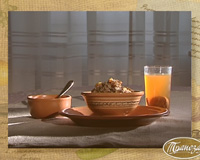
The other main dish is vzvar, of apples, pears, plums, raisins, cherries and other fruits boiled in water. Vzvar has symbolical meaning. It is cooked to celebrate the birth of a child.
K olyadki,
or kalitki, are small pastries made of fresh rye dough with various
fillings, fruit liqueurs, brushings or bakings. Fresh rye dough is
rolled out into a thin 5mm layer and cut into squares. The edges
are bent up, and the corners are pinched to make a flat box. It is
filled with various fillings and baked. The name derives from
Kolyad - an ancient pagan holiday that later merged with Christmas.
olyadki,
or kalitki, are small pastries made of fresh rye dough with various
fillings, fruit liqueurs, brushings or bakings. Fresh rye dough is
rolled out into a thin 5mm layer and cut into squares. The edges
are bent up, and the corners are pinched to make a flat box. It is
filled with various fillings and baked. The name derives from
Kolyad - an ancient pagan holiday that later merged with Christmas.
Like the words of colloquial (разговорной) speech get borrowed (заимствованный), the original national cuisine or individual dishes penetrate (входит) into other cuisines, if they are especially enjoyed. That is what happened to kolyadki.
 It
is now common practice, especially in little Russian towns and
villages, for groups of masquerading children having self-made
Bethlem stars in their hands, to travel from house to house singing
songs known as 'kolyadki'. Kolyadki are pastoral carols to the baby
Jesus. In return for their songs, the singers called
'kolyadovshchiki' are offered chocolates, sweets and coins, which
they gladly accept before moving on to the next home. This happens
on Christmas Day and some days afterwards.
It
is now common practice, especially in little Russian towns and
villages, for groups of masquerading children having self-made
Bethlem stars in their hands, to travel from house to house singing
songs known as 'kolyadki'. Kolyadki are pastoral carols to the baby
Jesus. In return for their songs, the singers called
'kolyadovshchiki' are offered chocolates, sweets and coins, which
they gladly accept before moving on to the next home. This happens
on Christmas Day and some days afterwards.
Kolyada has arrived,
On the Eve of the Nativity,
Holy Kolyada
Through all the courts, in all the alleys.
Give us a cow with a buttered head
Give us a pancake,
You'll have a smooth stove!
We found Kolyada
In Peter's Court.
Round Peter's Court
There is an iron fence,
In the midst of the court
There are three rooms,
In the first room is the bright Moon,
In the second room the red Sun,
And in the third room, the many stars.
May the Lord give health,
May the Lord give you wealth!
This magnificent original dish is very easy to cook. Probably, this is why it has been appreciated (оценено, признано) by many peoples, having become part of their national cultures, lives, fairy tales, songs, proverbs and sayings. However, in some countries the name of the dish is different. In Karelia and Finland, in particular, kolyadki are refered to as kalitki.
-
Finish the sentences:
-
Sochelnik is considered to be …
-
Apart from sochivo the feast would offer …
-
A typical Christmas dinner however, includes …
-
Sochelnik is the day of …
-
The Russian word for Christmas Eve 'sochelnik' comes from the word …
-
The other main dish is vzvar, of ….
-
Kolyadki, or kalitki, are small pastries made of …
-
The name derives from Kolyad …
-
It is now common practice, especially in little Russian towns and villages, for groups of masquerading children having self-made Bethlem stars in their hands, …
-
This magnificent original dish is …
-
Choose the right answer
-
-
… dishes were put in the centre of the table in the days of old the Christmas. a) ten; b) twelve.
-
There is a saying that you … eat anything on Christmas Eve, until the first star has appeared in the sky a) can't b) can
-
The 'sochivo' is eaten from a common dish a) to symbolize unity; b) celebrate the birth of a child.
-
Kolyadki, or kalitki, are a) are small pastries made of fresh rye dough; b) pastoral carols to the baby Jesus
-
Kolyadki, or kalitki, are small pastries made of fresh a) rye dough; b) wheat dough
-
-
Would you like to listen to Russian Christmas kolyadki? Research this link: www.pravmir.ru/rozhdestvenskie-kolyadki/
-
Would you like to help your mother to cook sochivo or kolyadki for Christmas dinner? Research these links:
-
-
www.russianfoods.com/recipes/item001F6/default.asp
-
www.russianfoods.com/recipes/item001EC/default.asp
-
-
Work in pairs. Imagine your pen-friend from Great Britain wants to know more about typical Christmas dinner in Russia. Make lists of traditional Russian Christmas dishes. Compare your lists.
-
4
Do you want to know how to say Merry Christmas in
Russian?
In Russia people don't say exactly Merry Christmas! They
wish each other
-
Have your Christmas full of Light!
-
So Svetlym Rozhdestvom Hristovym! -Со Светлым Рождеством Христовым!
Ссылки:
http://www.theholidayspot.com/christmas/worldxmas/russia.htm
www.russian-language-for-lovers.com/russian-christmas.html
www.whychristmas.com/cultures/russia.shtml
en.restoran.ru/msk/news/masterclass_or_study/kolyadki
www.travelcentre.com.au/travel/russia/russian_christmas.htm
www.russia-ic.com/culture_art/traditions/645/
ana-sm.ru/2008/01/05/sochelnik.html
www.otvetin.ru/page/365/
rus.glas.org.ua/projects/trapeza/kutya.html
www.start.crimea.ua
www.photographer.ru/events/afisha/1090.htm
adalin.mospsy.ru/ny/eligr.shtml
www.wild-mistress.ru/wm/wm.nsf/publicall/2008-10-31-83745.html</</u>
Литература:
-
Азаров А. А. Русско-английский словарь религиозной лексики. - М.: РУССО, 2002
-
Ляховская Л. П. Энциклопедия православной обрядовой кухни. - М.: Издательский дом МСП, 1995
-
Михайлов В.С. Православная кухня. - М.:КУбК-а,1996
-
Полный церковно-славянский словарь: В 2 т./ Состав. священник магистр Г.Дьяченко. - М.: Терра -Книжный клуб,1998
-
Смолянский Б.Л., Григоров Ю.Г. Религия и здоровье. Киев.: Здоров'я,1995
7